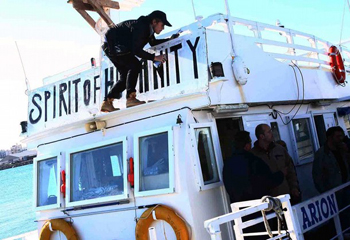There’s nothing clean about the business of politics, and certainly ethics play no part part in it – unless they can be exploited for personal gain. Julia Gillard, this slow-speaking nasty piece of Labor conservatism, camouflaging as deputy prime minister of Australia (hard to believe she’s been a student activist once representing the political left), presented yet another example for political sanctimoniousness with her phony stance on Palestine and her fervent defence of Israel’s fascist practices against the Palestinian people.
It always amazes me how the politicians of the West are able to manage to twist their thoughts and mangle their speech in face of overwhelming evidence of Israel’s blatant violations of international law and acts of barbarism against unarmed civilians – from cold blooded murder to depriving their victims of such basics as a roof over their heads, food on their table (if they still have one left) or medicines for their hospitals. Not speaking out against such brutal savagery leave alone defending it makes people like Gillard undoubtedly an accomplice of the Israeli regime and its crimes against humanity.
The following op-ed puts Gillards politics and values in the context of Israel’s war crimes and recent acts of piracy on the high seas.

Politicide or politic: Gillard and the Gaza muzzle
Jake Lynch
Sydney Morning Herald
Days after the Deputy Prime Minister, Julia Gillard, was greeted in Israel and thanked for having been “alone in sticking by us” during Operation Cast Lead, the attack on the Gaza Strip in December and January, the Jewish state added piracy to its list of recent crimes against international law. The two developments are connected, and not just by coincidence of timing.
Israel sent six military vessels to seize a ship, the Spirit of Humanity, sailing from Cyprus with relief supplies for the people of Gaza, and arrested – no, make that abducted – 21 people on board, including the Nobel laureate Mairead Corrigan Maguire. After a week in detention, they were released and deported.
At no time did the Spirit enter Israeli waters, so Israel’s action could be deemed piracy under the definition of the International Maritime Bureau: “The act of boarding any vessel with an intent to commit theft or any other crime, and with an intent or capacity to use force in furtherance of that act”. At least it amounts to an infringement of the United Nations Convention on the Law of the Sea, which reserves the high seas for “peaceful purposes”.
The Spirit’s three-tonne cargo included medical and reconstruction supplies, and children’s toys. Greece, whose flag the ship was flying, has asked for its return, and Israel says some of the goods on board may be passed on to Gazans for whom they were intended, “subject to security clearance”. For now, it is forcibly keeping them from their rightful owners.
The international jurist Richard Falk, who has served as UN Human Rights Rapporteur for the occupied Palestinian territories, points out that this compounds an existing and ongoing violation of international law. The boat set sail in response to Israel’s blockade of Gaza, which, Falk says, contravenes Article 33 of the Fourth Geneva Convention, which prohibits any form of collective punishment of an occupied people.
A study of the transcripts of Ms Gillard’s speeches and interviews, from her recent trip to Israel and Ramallah, reveals that the word “Gaza” did not once pass her lips. Challenged by a reporter to say whether she believed Israel’s treatment of the Palestinians was “fair and just”, she avoided the question and retreated into platitudes: “We are concerned about the humanitarian situation of the Palestinian people”.
This amounts to connivance with what the late Israeli political scientist Baruch Kimmerling called “politicide”: Israel’s desire to have the outside world forget Palestinian political aspirations to self-determination, and regard their struggle in purely humanitarian terms.
Gillard’s don’t-mention-Gaza stance puts Australia further into Israel’s camp than any other country, including the United States. Cynthia McKinney, the former US congresswoman who was on the ship, points out that President Barack Obama called the blockade “unjust” and urged its lifting, so she, as an American citizen, was attempting to carry out his wishes.
The European Union responded to Cast Lead by shelving plans to upgrade its trading relations with Israel, and even ASEAN, through the Heads Statement of its 14th summit, identified Israel’s attack as the cause of a humanitarian crisis, and called for an immediate ceasefire.
Gillard, standing in for the Prime Minister at New Year, characterised the onslaught as no more than Israel exercising its “right to defend itself” against Hamas. Hamas, she told her questioners in the Middle East, would first have to “renounce violence” if it wanted to qualify as a partner in any peace process sponsored by the “quartet” of the UN, EU, US and Russia.
The home-made rockets that Hamas militiamen fired into Israel were indiscriminate weapons, and the 20 or so deaths they caused over several years are war crimes, but all independent observers have pointed out the obvious – that pales into insignificance when compared with the impact of Israel’s high-tech weaponry, which claimed 1300 lives, mostly civilians and including 400 children, and injured thousands. No stipulation from Australia, then, that Israel must also renounce violence as a precondition to have its views heard at the top table.
Israel is aware of acting within the scope allowed by international political opinion: it does what it believes it can get away with. The unexpected firmness of the White House on settlement-building had constrained its room for manoeuvre. Gillard paid lip service to a settlement freeze and a two-state solution – but her visit as the leader of a large delegation, her demeanour and above all her refusal to condemn Israeli lawlessness or call for it to cease, all conspired to send the opposite signal.
Thousands of people whose homes Israel destroyed are still without shelter, says the International Committee of the Red Cross, because Israel refuses to allow cement and other building material into the Gaza Strip. The report also notes that hospitals are struggling to meet the needs of their patients due to Israel’s disruption of medical supplies.
It is this situation that the passengers and crew of the illegally seized vessel were trying to remedy. They have vowed to send more boats. Israel should let them pass, and Australia should say so.
Associate Professor Jake Lynch is director of the Centre for Peace and Conflict Studies at the University of Sydney.













![Reblog this post [with Zemanta]](https://i0.wp.com/img.zemanta.com/reblog_e.png)

